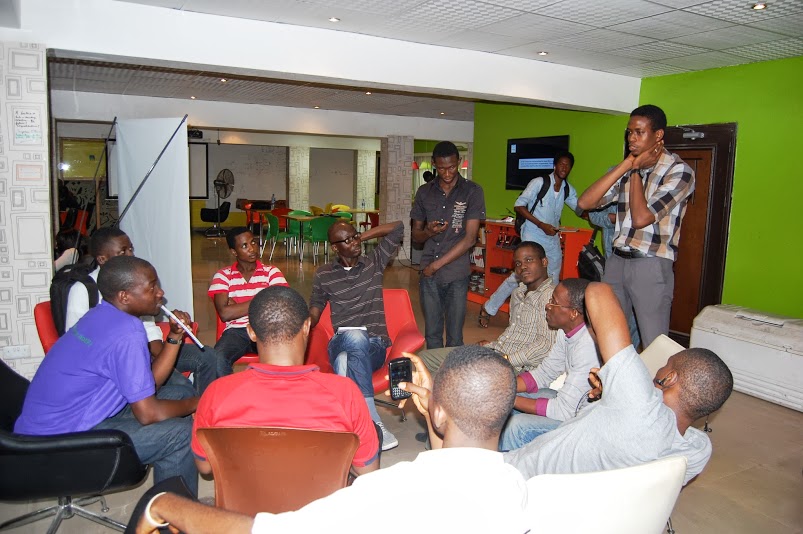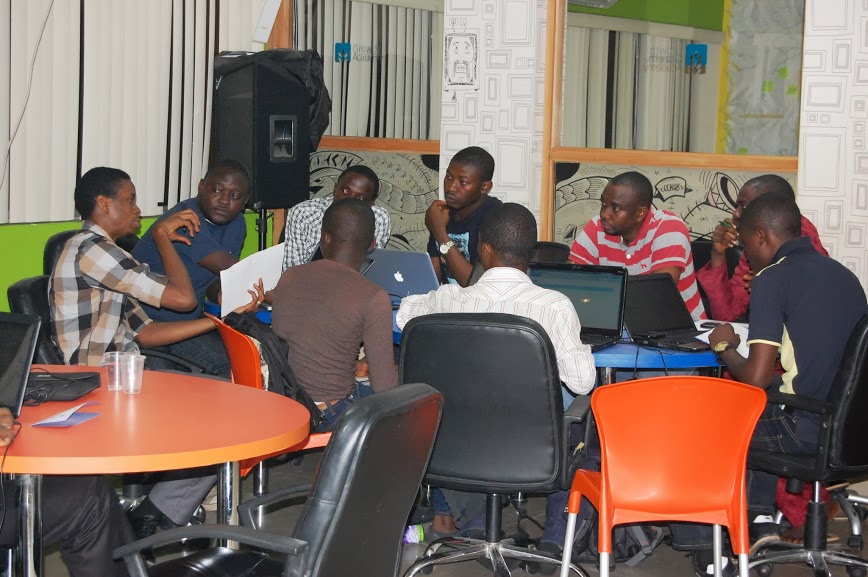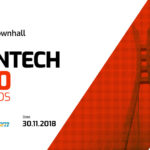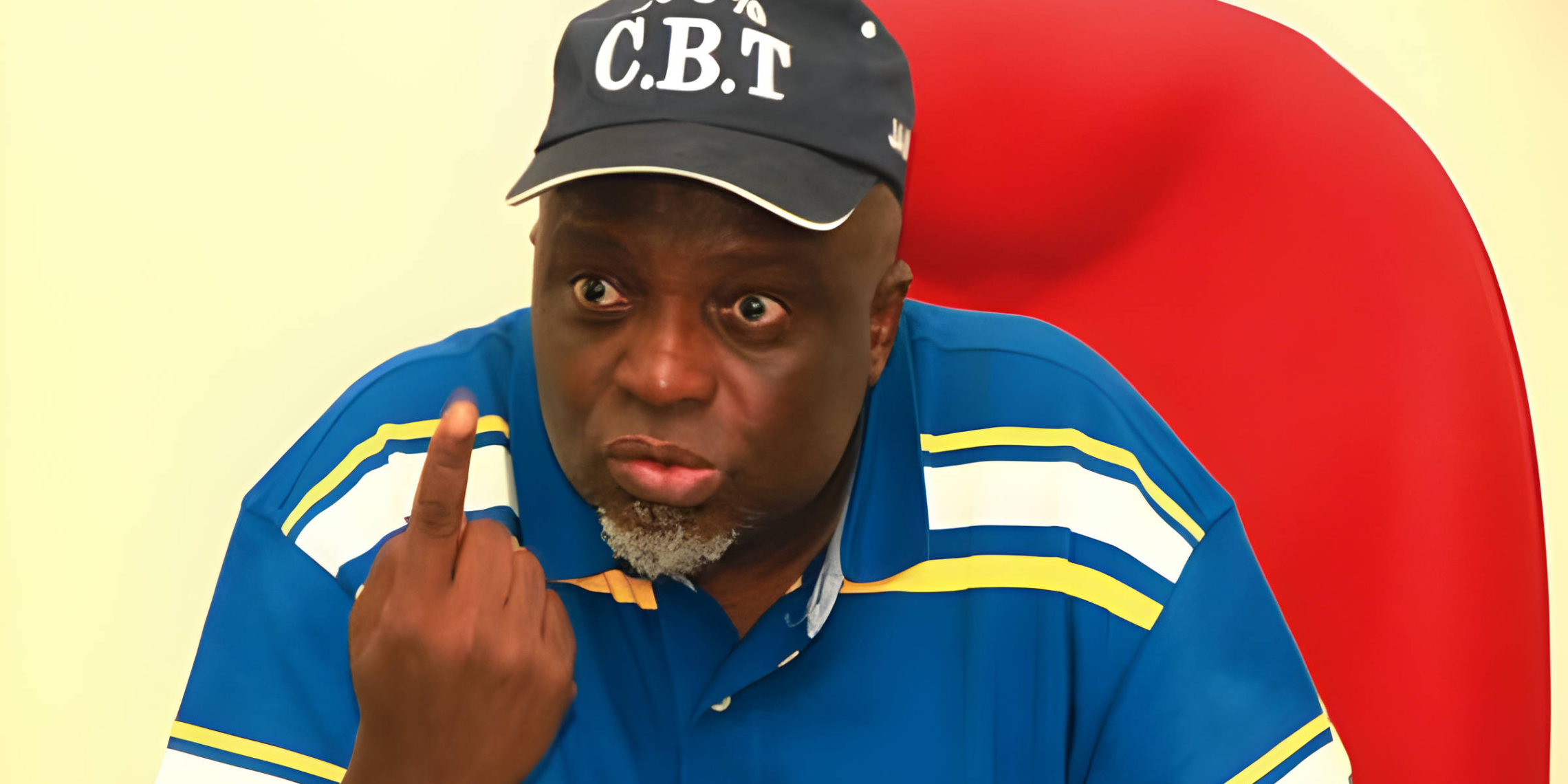I can’t code. So I really had no business being at a code party. Even so, I found myself sleeping in my clothes, blinking at my computer, and drinking cold coffee with a bunch of code-slingers and code-slinger wannabes at the CcHub two Fridays ago.
Whose idea was this? Not sure, but I know that the CcHub teamed up with the Lagos Google Developer group to host an all night coding session, in the spirit of Google IO, which was ongoing at the time. The idea was simple. Developers in Lagos would come together to eat food, drink beer, and most importantly, build actual stuff with code, overnight.
Femi Taiwo, who is the Lagos GDG coordinator (among other things), was the event’s brains and brawn for the most part. He told me that he wasn’t sure how many devs would turn up, and was actually mentally prepared for the possibility that only five people would show up. In the end, much more than five people did, and even though the number of the company thinned after 9pm, a few dozen guys stayed behind to code. Which was great, actually…it meant there was more than enough food and beer to go round.
Downing the grub was the easy part. Now on to the code.
By then four project ideas had been pre-selected via an interactive brainstorm, and the remaining company broke into groups to work on them. By 6am, we regrouped to see what each team had done. Short descriptions of each –
Help A Cause – a charity platform that facilitates donations from Nigerians in Nigeria and abroad. Next, they are planning to set up NGO partnerships, identify pilot causes and integrate online payments.
iVolunteer – allows people to volunteer to help accomplish designated goals, from filling a pothole in the street to painting the community hall
OpenGovernance – track the performance of each of the political office holders, their promises and their mistakes. Allow the public to followup specific infrastructural projects and maintenance etc
DevHub – a community-driven discovery platform for coders, designers and serious tech Enthusiasts in Nigeria. A search engine for techies, if you will. They consider the project to be at 60 percent completion (it’s already live). Next they plan to implement a new design and populate the platform with tutorials and articles.
You might have noticed something about the projects listed above though. They look to be a bit complex and not necessarily about code. They look like they’ll need to be nurtured, even after the code party is over, which raises the question of whose babies will these newly birthed ideas will be. And they’ll certainly require all kinds offline, non-tech legwork to make real. Makes you wonder if it’s still a code party or a proper hackathon.
Femi (by the way, he’s the common denominator in all three photographs) and I had a discussion about that after the event, and I think we agreed that a code party should be exactly that — about code, and done in an agile manner. It should be about the latest coding tips, tricks, frameworks and standards, the nifty implementation demos that show what you can do with them…that sort of thing. And the fun part will be doing actual stuff right there and then. Nothing too elaborate, but sufficiently meaty that it takes everyone through the process, from idea to working product in the shortest time possible. A tiny messaging app that demonstrates Web RTC? A bare bones HTML5 game? A quick and dirty LinkedIn API implementation perhaps? Something short, sweet and simple that needn’t try to save the world. Yet.
Rather than saddling people with yet another long ass project they didn’t ask for, it makes a lot more sense to have lots of quick wins — modular units of achievement that can scale via the subsequent interest of people and possibly third parties who feel inclined to take it further. That, in my opinion, is what differentiates a code party from a hackathon, where the intent is to create actual and sustainable startups.
Whatever the case, Femi and company were so pleased with the results of the first event that they’ve tentatively decided to have a code party every month. How they intend to keep that pace up beats me, but I think it’s a great idea, on many levels. For one, events like these give developers and excuse to get out from whatever hole they’ve dug themselves into and sharpen themselves against/interact with other people like them. It’s not nearly as laid back as a Gameday, but a code party is informal enough for guys to strike up potentially long term relationships, while still serious enough to deliver practical value for the time spent.
Big ups to Femi Taiwo and the CcHub for putting it together. One question though — how do we get some of our ogas at the top in development and design to participate in this sort of thing going forward? Chairmen like Chuka, Editi, Mark, Aniedi (he was present on said day), Tim, Francis, Kehers, Namzo, Ajibola, Ezra, Dele…and many, many more I can’t mention here are people I’d like to see pitching in to mentor the next generation.
Like the unabashed ecosystem voltron that I am, I am using this medium to appeal to all the stakeholders in the space to please join hands and support this laudable initiative when next it arises. I’m sorry for reverting to Nigerianese back there, but you get the idea.





















